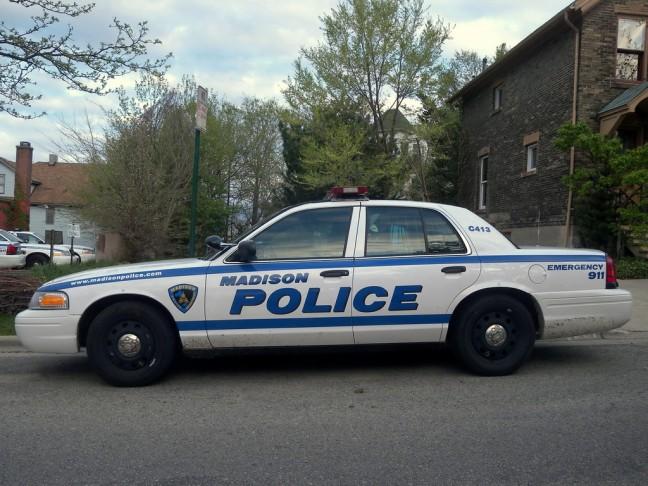Madison Police Department reacts to Ferguson:
In the wake of the death of Michael Brown, unarmed and killed by a police officer in Ferguson, Missouri, Madison Police Chief Mike Koval made his policing philosophies clear and addressed issues of transparency.
As Ferguson police met protesters with SWAT gear and riot shields, Koval said he prefers a more approachable style of policing in Madison.
“When you’re in a community like our own, vibrant with thinkers and thousands of young students that, I hope, are learning to challenge authority, we can’t be a traditional call and response sort of operation,” Koval said. “You can’t start engaging someone by trying to talk through a kevlar helmet with a glass visor. It sends the wrong message.”
Similarly, the lack of video evidence in Brown’s death led to a national call for the implementation of body cameras on police. Ald. Scott Resnick, District 8, has been a leading proponent of the cameras. President Barack Obama also made the technology a priority, setting aside $75 million in federal funding for 50,000 cameras for police departments across the nation.
Resnick said this is an encouraging step toward further transparency in policing by securing funding for the cameras.
“Our president has made a call to action for state government and local municipalities to implement body camera programs,” Resnick said. “I don’t think there’s any excuse at this point not to move forward.”
An ad-hoc committee is being created in 2015 to examine the feasibility of implementing the cameras in Madison. If the committee makes a recommendation for the cameras, the city will launch a pilot program the following year, Koval said.
However, Koval said he does not think the cameras will be a “one-size-fits-all cure.”
“This is not a simple fix, and the deeper fix has to be rooted in how we police our people, not how we capture those transactions,” Koval said.
Madison hoping to cross the digital divide and close the achievement gap:
Hoping to close the “digital divide,” Madison is looking into ways to provide high-speed internet to low-income neighborhoods and for students of families who cannot afford it.
Ald. Scott Resnick, District 8, proposed a $100,000 amendment to the 2015 city budget that will fund a feasibility study to examine the different ways city-wide internet could be realized.
“If you think about students in the Madison School District, there are still students who don’t have access within their homes,” Resnick said. “When they try and compete in the classroom it becomes a huge disadvantage. The answer of ‘you can go to the library’ is no longer a satisfactory solution.”
So far, the city has received interest from four vendors: a local company, a company from Nevada and two from T-Mobile and U.S. Cellular. All of these proposed a 4G wireless network as a solution, rather than fiber optic cables, Resnick said.
Mayor Paul Soglin has been a supporter of the initiative as well. Soglin said closing the digital divide is the first step toward minimizing the achievement gap caused by financial and educational disparities.
“We have to take some risk and if we’re serious about doing something about the divide in this community, if we’re serious about what’s going on in low-income households. This is one mechanism which is relatively cheap given the way we’re spending money to get some really significant outcomes, not just in terms of education, but also in terms of job opportunity,” Soglin said.
City works to solve achievement gap, close the ‘digital divide’
Koval says yes to weed:
Citing ineffective enforcement strategies and a possibility for tax revenue, Madison Police Chief Mike Koval said he supports the legalization of marijuana.
While he said he is not encouraging the use of any substance like tobacco, alcohol or marijuana, Koval said he has other priorities to worry about in Madison.
“I look at the myriad of instances that confront the police, not the least of which is weapons offenses, crimes against persons and heroin,” Koval said. “In relative scale, casual possession of marijuana does not rise to the top of our things to do.”
Koval said he favors legalization because he assumed it would be heavily regulated and taxed and the revenue would be used to fund therapeutic interventions or alternatives to incarceration.
Koval said the ultimate benefits of marijuana legalization for Wisconsin would be fewer arrests and fewer instances of racial disparities in incarceration. Racial disparity in drug-related offenses in Madison, however, is something Koval said needs to be addressed sooner than later.
“The rate of arrests … for possession of marijuana, as is the case of most possessory drug crimes, is significantly higher for African-American males than it is for the rest of the demographics of our city,” Koval said.
According to an analysis by MPD, about 60 percent of people arrested for drug crimes last year were white. The overwhelming majority of the remaining portion of people arrested were black. In comparison, Madison’s population is 75 percent white and only 7 percent black.
However, Koval made it clear that marijuana is currently illegal and MPD will not stop doing their job anytime soon. Madison’s issue of racial disparities in drug arrests, he said, is just representative of larger problem that stretches nationwide and needs to be addressed.
















